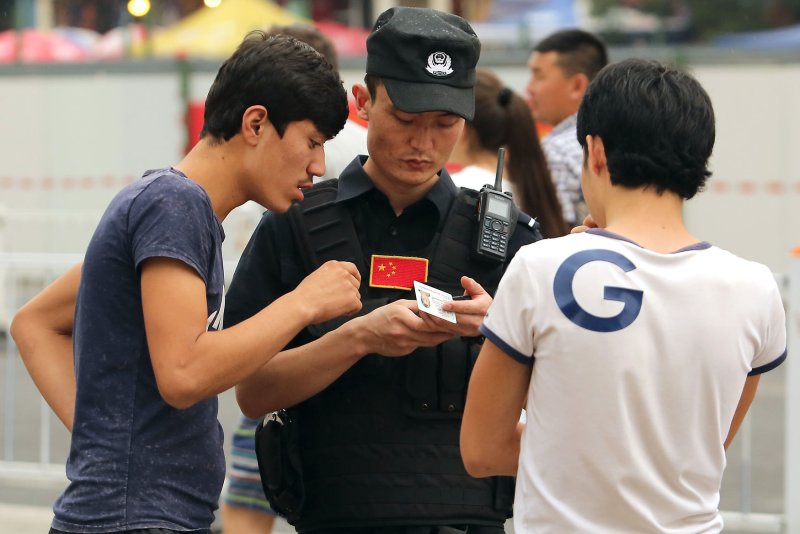Chinese military police check the identification of Uyghur and Kazak men next to a mosque and tourist center during Ramadan in the Xinjiang province on June 27, 2015. A senior Chinese official announced Tuesday that most of the Uyghur and other Muslim minorities held in internment camps have been released. File Photo by Stephen Shaver/UPI |
License Photo
July 30 (UPI) -- China announced Tuesday that it released up to 1 million or more people from a predominantly Muslim ethnic group held in internment camps, prompting skepticism from activists.
The U.S. State Department said up to 2 million members of the Uyghur and other majority Muslim ethnic minorities have been detained against their will in internment camps in the region of Xinjiang during the past two years.
During a press conference in Beijing on Tuesday, Xinjiang Uyghur Autonomous Region Chairman Shohrat Zakir defended the camps and announced that most of the people held in them have "gone back to society."
"I can say 90 percent of them have found suitable and enjoyable jobs that bring them considerable income," he said.
Zakir said the camps are "vocational training centers" and not "concentration camps as called by some people."
He did not provide evidence of the releases, nor did he specifically state how many people had been released, saying "people arrive and leave constantly."
U.S.-based Uyghur activist Tahir Imin told The New York Times that other Uyghurs living internationally hadn't found evidence of the widespread releases.
"Uyghurs abroad continue to be unable to reach their relatives in the region. No phone calls, no Internet communications," Imin said. "If the Chinese government is honest and confident in what it's saying to the media, it should allow people to communicate freely and go out of the country freely and allow independent media to visit and investigate freely."
Amnesty International's Asia Regional Director Nicholas Bequelin issued a statement accusing China of making "deceptive and unverifiable statements" in order to quell concerns about the detentions of Uyghurs.
"Given China's record of heavy censorship, outright falsehoods and systematic obfuscation about the situation in Xinjiang, it remains imperative that U.N. human rights investigators, independent observers and the media be given unrestricted access to the region as a matter of urgency," Bequelin said.















